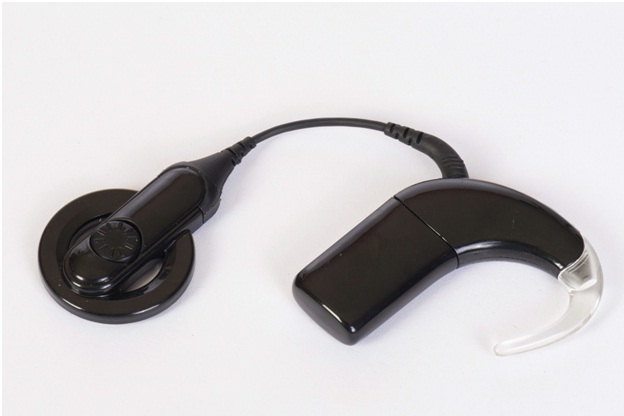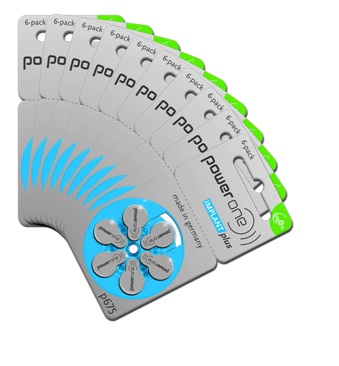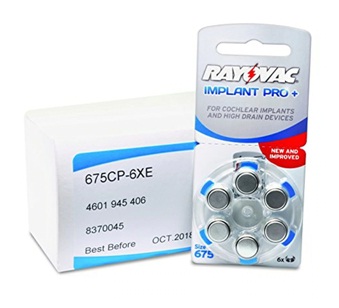Why Quality Matters in Cochlear Implant Batteries
Apr 12th 2021

Some of us rely on hearing aids and other supplementary devices to better interact with the world around us. Anyone who has ever been afflicted with a condition that affects their ability to perceive auditory stimuli knows one simple fact, impressive language notwithstanding: when you lean on a device to hear, you really lean on it.
Simple conversations, family gatherings, and even something as simple as watching the TV or listening to music are all things that you might take for granted - until you were no longer able to easily hear them. It’s either something you have experienced firsthand - or you won’t be able to fully appreciate how important these hearing aids and devices like cochlear implants are.
With that in mind, not all devices are the same. There are hearing aids as well as cochlear implants, and no two of these devices, despite their similarities, are entirely alike.
If you have cochlear implants, for example, the considerations you’re going to need to take when you evaluate something like batteries for them is no light matter - and we’ll get to that. When you rely on devices like these to interact with the world around you and to take full advantage of the time you spend with people that matter, you need to invest some time in learning about care and maintenance.
A Brief Intro to Cochlear Implants
Hearing aids are devices that, generally, sit within or partially within the ear and amplify sounds picked up from the environment, projecting them crisply into the ear canal. They’re like tiny speakers you place in your ear that make it easier for you to hear what’s going on around you. These, like cochlear implants, require batteries - but they can easily be removed and maintained.
Cochlear implants are much more complex than hearing aids by comparison. They are more powerful and much more intricately engineered than hearing aids and because of their advanced capabilities are typically only utilized for people that are almost entirely deaf for very hard of hearing.
The device itself has several components. The implant consists of a receiver that is surgically implanted under the skin behind the ear and directly stimulates the auditory nerve to pass along auditory information. It is not the only part of the array and relies heavily on the interrelated functionality of the device’s other parts.
In addition to the implants themselves that lay behind the ear under the skin, there is a microphone that is a part of the array that picks up sounds from the environment, as well as a processor that arranges the sounds picked up by the microphone itself.
Finally, the device has a set of electrodes that are responsible for collecting the auditory information from the microphone and coding them into electrical signals that get relayed to the auditory nerve.

It can be seen from this very high-level view that cochlear implants are significantly different and much more technologically advanced and complex than hearing aids. Whereas, for lack of a more technical term, hearing aids are like “tiny loudspeakers,” cochlear implants receive sounds, then rearrange and code them before sending them as information to the auditory nerve. This does not allow the person that has them to “hear,” but it does enable them to receive and analyze auditory information.
It is said that those with cochlear implants take some time to “relearn” how to process the information that is picked up by their brains from the devices, as it is different from what the rest of us hear as sound. However, one thing is certain; these devices are revolutionary for the people that rely on them to better interact with the world.
Cochlear Implant Batteries: The Life Force of the Device
Cochlear implants, like any complex device, are only as good as the components from which they are made. Also, like hearing aids, they require a power source, which takes the form of batteries. The size and nature of the batteries that are compatible with your cochlear implant will depend on the device itself; if you’re not sure of what you need, you can always reach out to us at sales@localbattery.com requesting information. Let us know what you have and we’ll put you in touch with batteries that will work for your purpose.
However, in the event that you’re aware of what is compatible with your cochlear implants and you have several options at your disposal, you might be here looking for specific information on the value afforded by each. One of the biggest choices you’ll have to make is whether you intend to utilize your device with single-use batteries like zinc-air batteries or rechargeable cochlear implant batteries.
Single-Use (like Zinc-Air) vs. Rechargeable Cochlear Implant Batteries

One of the most distinguishing features among batteries for cochlear implants is how long they will last and how many times you will use them. Among batteries that are not rechargeable, this dwindles to how long the batteries themselves will last.
Understandably, it needs no further explanation that single-use batteries are only good for one use until they die. Some of the most popular batteries in this arena are zinc-air batteries, which, unlike many other forms of batteries, utilize atmospheric oxygen to catalyze a reaction in order to release energy.
The way they work is fairly complex but it can be simplified. Those colorful tabs that sometimes accompany your little hearing aid or cochlear implant batteries - those are not simply for helping you identify battery sizes from afar; they are useful for that, but they serve an equally important function; preserving the life of the battery.
You see, the little tab covers up an exposed portion of the battery (in the case of zinc-air batteries) and protects it from exposure to the air. This prevents air from reaching the cell and keeps the battery functionally alive until you need to use it, for a few years at most if stored in the right conditions.
When the tab is removed, the battery is exposed to air and the reaction that releases energy can begin, during which time the battery will slowly die over the course of a few weeks, usually lasting less than a month once placed into the device.
At the positively charged end of the battery, there is a zinc paste and an electrolyte that is exposed to the atmosphere. When oxygen interacts with the zinc paste, the zinc oxidizes into zincate, which releases electrons that travel through the matrix of the battery and result in an electrical potential that enables the battery to power devices.
Single-use batteries like these are relatively powerful for their size and cost, and their projected lifespan once installed will vary according to the size of the battery. However, in most instances, batteries like these will last somewhere between 10 days and a little less than a month, depending on use and some other conditions.
On the other end of the spectrum, you have rechargeable cochlear implant batteries, the lifespan of which can be extended significantly by virtue of the fact that they are not single-use. Depending on the size of the battery itself, the lifespan will vary - some rechargeable batteries will last somewhere around 8 hours whereas some will last for closer to 40; either of these figures equates to a few days of use, depending on how long you’re actually using them.
What makes rechargeable batteries desirable is the fact that, obviously, they can be recharged, but there is a limit to this as well. Most rechargeable batteries should last for at least a couple of hundred charge cycles, with upper limits sitting somewhere around 500 cycles. At the upper range, rechargeable batteries can potentially last for longer than a year, even with moderate to heavy use.
Eventually, all batteries need to be replaced, and even long-lasting rechargeable batteries that can survive through many charging cycles will not last forever. However, if you’re conscious about use and cost, you might be able to cut back on costs and enjoy greater convenience with batteries that can be recharged and don’t need to be discarded
How to Ensure Quality in Cochlear Implant Batteries [and Why!]
When you’re evaluating whether or not a set of batteries is right for you, the most important question you need to have answered is whether or not they’re compatible in the first place.
For example, many cochlear implants take size 675 batteries, of which there are many different brands - but not all cochlear implants take them. Make sure, first, that you know what type of batteries you’re looking for and if you don’t know get in touch with us. Then you can square away these other concerns.
●Life span: Probably the most important thing most customers are looking for is a long-lasting set of batteries for their cochlear implants. The longer the batteries last, the longer you can go between having to change them out. It’s convenient and it improves your quality of life - not to mention, the fewer times you need to swap out your batteries, the more money you will save. There are quite a few benefits to this trait, as you can see.
●Shelf life: after lifespan, shelf life is probably the most important thing that most customers are looking for in their batteries. The longer you can leave batteries unopened in reserve, the more prepared you can be for when batteries inevitably fail before they should. Getting caught unaware by a dead battery is a pain, but if you have enough in reserve that are ready to go, you won’t have to deal with this problem with frustration.
●Number of cycles: For those of you interested in rechargeable batteries, or with cochlear implants that can accept rechargeable batteries, this might be the route for you to go. If you use them, the number of cycles the battery can go through before it starts to fail is a critically important asset. Fewer cycles will cost you more money and frustration in the long run. Obviously, by contrast, a more reliable, longer-lasting battery that will survive more cycles is preferable.
●Ease of use: These tiny batteries can be frustrating for some to install and manipulate, which is one of the reasons that lifespan is held in such high regard. With that being said, it’s common practice for batteries to be color-coded according to size and configuration and the tab that protrudes from the stickers of some can make them easier to manipulate and install.
●Contact us for help: If you have any questions about other traits to look for or what batteries to use, make sure you get in touch with us. We’re proud of our customer service and we’ll do what it takes to see - and hear - that you’re happy.
As for why it matters, it’s important to have the most valuable, most reliable, longest-lasting batteries on hand so that you’re always ready. You can’t afford to go a day without being able to hear or interact with the world, and having a spare supply can save you some trouble down the line. It’s a simple answer to the question of “why quality matters” but we believe it drives the point home.
Shop with Us!
The next time you’re out there looking for cochlear implant batteries, be it today or next month, put your faith in Local Battery. We have a countless number of different batteries, both mercury-free metal-air and rechargeable batteries for both cochlear implants and hearing aids, in a wide range of different sizes and configurations.
Selection isn’t our only game - we also have excellent prices and compete with some of the biggest names out there. That’s why some of our customers keep coming back to us time and time again - we keep prices down.
We also offer fast, secure shipping and are always here to help you out when you need it. If you’ve come up with any questions while reading this article, whether they’re for battery recommendations or for care and maintenance of your hearing aids, make sure you get in touch with us at sales@localbattery.com; we’ll help you out!


